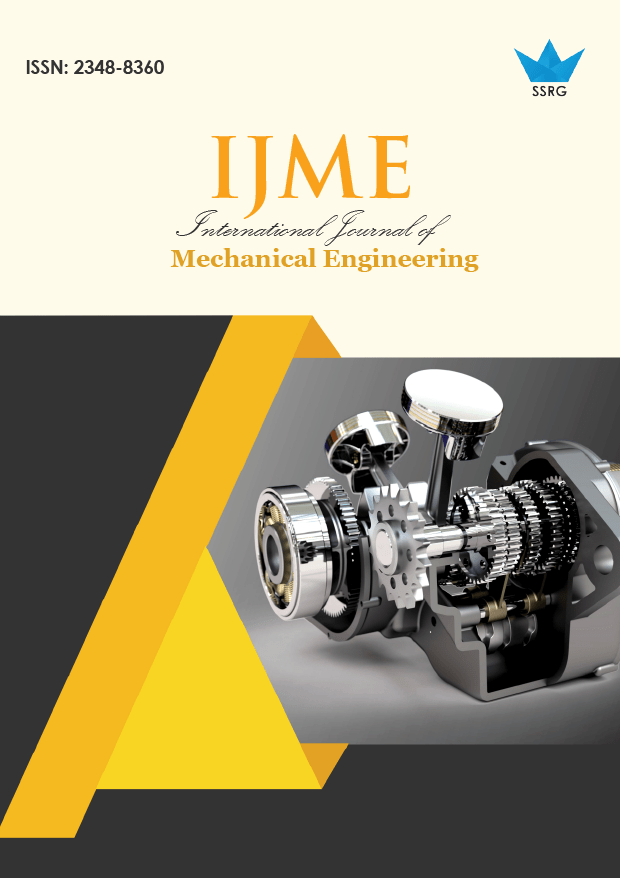Energy Recovery from Municipal Solid Waste in the Port Harcourt Metropolis, Nigeria

| International Journal of Mechanical Engineering |
| © 2019 by SSRG - IJME Journal |
| Volume 6 Issue 1 |
| Year of Publication : 2019 |
| Authors : Anthony Kpegele Le-ol, Confidence Koate |
How to Cite?
Anthony Kpegele Le-ol, Confidence Koate, "Energy Recovery from Municipal Solid Waste in the Port Harcourt Metropolis, Nigeria," SSRG International Journal of Mechanical Engineering, vol. 6, no. 1, pp. 7-12, 2019. Crossref, https://doi.org/10.14445/23488360/IJME-V6I1P102
Abstract:
This research presents an energy recovery from municipal solid waste (MSW) in Port Harcourt metropolis, Rivers State. The main focus is to investigate the conditions of renewable municipal solid waste (MSW) generated in Port Harcourt and to properly evaluate the minimum quantity of electricity that can be made from the MSW on a daily basis using the combustion pathway. The data used to assess the availability of the fuel (MSW) were obtained from waste dumpsites controlled by Rivers State Waste Management Agency (RIWAMA). The various parameters for the combustion chamber, which utilizes mass combustion in stoker crate furnace, were selected for the amount of MSW generated in Port Harcourt and operated at different steam saturation pressures within (20 – 45) bar, with a fuel consumption rate of 11.88kg/s. Analytical tools were used to analyze the combustion characteristics of the chemical compositions of the waste generated. The result revealed that for every kg of MSW combusted, 6.63kg of air is required for complete combustion generating an optimum flue gas mass flow of 87.63kg/s and temperature of 400oC. The flue gas of mass flow ranging from 70.37kg/s - 87.63kg/s produce steam within the range of 9.2134kg/s – 9.8482kg/s at different steam pressures and stack temperatures. These indicate a resultant average net power output of 4.47MW of electricity when retrofitted to a steam turbine plant. This work thus showed that there are huge potentials in generating electrical energy from MSW in Port Harcourt, employing appropriate technology.
Keywords:
Combustion, Electricity, Energy Recovery, Mass flow, Municipal Solid Waste, Power Output.
References:
[1] Soulios, V., Kosmas D., Metavitsiadis V. & Marnelos G. (2015). “Production of electricity from municipal solid waste in kos." Proceedings of the 14th International Conference on Environmental Science and Technology Rhodes, Greece, 2015, 3-5.
[2] Sukhatme, S. P, & Nayak, J. K. (2011), Solar energy: “Principles of thermal collection and storage.” New Delhi: Tata McGraw Hill.
[3] Prisyazhniuk,V. A. (2008). “Alternative trends in the development of thermal power plants." Applied Thermal Engineering, 28, 190–194.
[4] Ikuponisi, F. S. (2006). “Status of Renewable Energy in Nigeria, an international Conference on making renewable Energy a Reality”. ONE SKY- Canadian Institute of Sustainable Living, 21-27.
[5] A. Ahmed "Using Waste Heat of Output Gases for Energy Conservation", International Journal of Engineering Trends and Technology (IJETT), V53(1),32-38 November 2017.
[6] Rao, S. & Parulekar, B.B. (2007). “Energy Technology; Non –Conventional, Renewable and Conventional," Khanna publishers, Naisarak, Delhi.
[7] Aguilar-Virgen, Q., Armijo-de Vega, C., Taboada-González, P. A., & Ojeda-Benítez, S., (2010). “Municipal Solid Waste Generation and Characterization in Ensenada”, Mexico; The Open Waste Management Journal, 3, 140-145.
[8] Ogaji, S. O. T., Probert, S.D. Igoni, A. H. & Ayotamuno, M. J. (2006). “Municipal solid-waste in Port Harcourt,” Applied Energy, 84(6).
[9] Ayotamuno, J. M. & Gobo, E. A, (2004).” Municipal Solid waste management in Port Harcourt, “Nigeria: Obstacles and Prospects Int. J. Mgt. Environ”. Qual, 15, 389-398.
[10] Igoni, A.H., Ayotamuno, M.J., Ogaji, S.O.T & Probert, S.D. (2007). Municipal solid-waste in Port Harcourt, Nigeria. Applied Energy, 84, 664-670.
[11] Le-ol, A. K. (2016). “Improvement of Omoku Gas Turbine Power Plant for Combined Cycle Operation.” M. Tech. Dissertation, Department of Mechanical Engineering, Rivers State University, Port-Harcourt, Nigeria.
[12] Nkoi, B., Koate, C. & Hart, H. I. (2018). “Thermo-economic Analysis of a Small Scale Retrofit Municipal Solid Waste Fueled Power Plant”. European Journal of Engineering Research and Science,3(3).
[13] Goswami, D. Y. & Kreith, F. (2008). “Energy Conversion”. Boca Ranton, London, New York CRC Press, Taylor & Francis Group.

 10.14445/23488360/IJME-V6I1P102
10.14445/23488360/IJME-V6I1P102